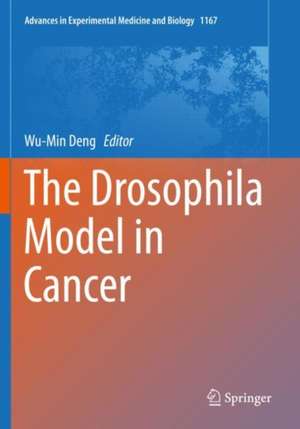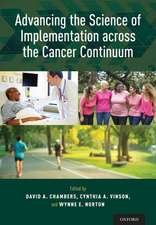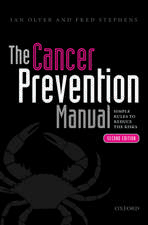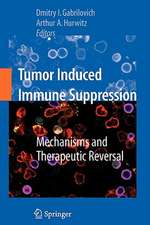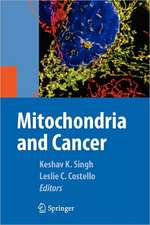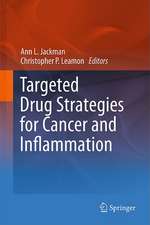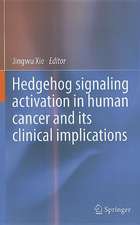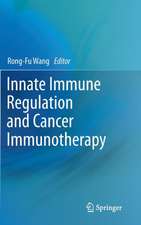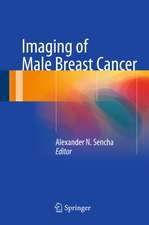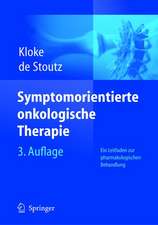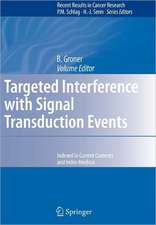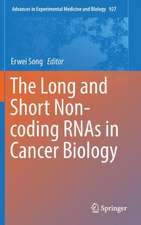The Drosophila Model in Cancer: Advances in Experimental Medicine and Biology, cartea 1167
Editat de Wu-Min Dengen Limba Engleză Paperback – 26 sep 2020
Readers will discover the beauty of the fly model’s genetic simplicity and the vast arsenal of powerful genetic tools enabling its efficient and adaptable use. This model organism has provided a unique opportunity to address questions regarding cancer initiation and development that would be extremely challenging in other model systems.
This book provides a useful resource for a researcher who wishes to learn about and apply the Drosophila model to tackle fundamental questions in cancer biology, and to find new ways to fight against this devastating disease.
| Toate formatele și edițiile | Preț | Express |
|---|---|---|
| Paperback (1) | 667.79 lei 39-44 zile | |
| Springer International Publishing – 26 sep 2020 | 667.79 lei 39-44 zile | |
| Hardback (1) | 724.50 lei 3-5 săpt. | |
| Springer International Publishing – 26 sep 2019 | 724.50 lei 3-5 săpt. |
Din seria Advances in Experimental Medicine and Biology
- 9%
 Preț: 719.56 lei
Preț: 719.56 lei - 5%
 Preț: 717.20 lei
Preț: 717.20 lei - 20%
 Preț: 691.93 lei
Preț: 691.93 lei - 5%
 Preț: 715.71 lei
Preț: 715.71 lei - 5%
 Preț: 1113.83 lei
Preț: 1113.83 lei - 5%
 Preț: 1031.00 lei
Preț: 1031.00 lei - 15%
 Preț: 640.24 lei
Preț: 640.24 lei - 5%
 Preț: 717.00 lei
Preț: 717.00 lei - 5%
 Preț: 820.42 lei
Preț: 820.42 lei - 5%
 Preț: 717.00 lei
Preț: 717.00 lei - 5%
 Preț: 715.35 lei
Preț: 715.35 lei - 5%
 Preț: 716.28 lei
Preț: 716.28 lei - 5%
 Preț: 716.28 lei
Preț: 716.28 lei - 15%
 Preț: 641.38 lei
Preț: 641.38 lei - 20%
 Preț: 1161.71 lei
Preț: 1161.71 lei - 5%
 Preț: 1170.51 lei
Preț: 1170.51 lei - 18%
 Preț: 1119.87 lei
Preț: 1119.87 lei - 5%
 Preț: 1288.48 lei
Preț: 1288.48 lei - 5%
 Preț: 1164.67 lei
Preț: 1164.67 lei - 5%
 Preț: 1101.73 lei
Preț: 1101.73 lei - 18%
 Preț: 1123.67 lei
Preț: 1123.67 lei - 5%
 Preț: 1435.64 lei
Preț: 1435.64 lei - 20%
 Preț: 1044.10 lei
Preț: 1044.10 lei - 18%
 Preț: 946.39 lei
Preț: 946.39 lei - 5%
 Preț: 292.57 lei
Preț: 292.57 lei - 18%
 Preț: 957.62 lei
Preț: 957.62 lei - 18%
 Preț: 1235.76 lei
Preț: 1235.76 lei - 5%
 Preț: 1231.55 lei
Preț: 1231.55 lei - 5%
 Preț: 1292.30 lei
Preț: 1292.30 lei - 5%
 Preț: 1102.10 lei
Preț: 1102.10 lei - 18%
 Preț: 1132.81 lei
Preț: 1132.81 lei - 5%
 Preț: 1165.19 lei
Preț: 1165.19 lei - 5%
 Preț: 1418.48 lei
Preț: 1418.48 lei - 5%
 Preț: 1305.63 lei
Preț: 1305.63 lei - 18%
 Preț: 1417.72 lei
Preț: 1417.72 lei - 18%
 Preț: 1412.99 lei
Preț: 1412.99 lei - 24%
 Preț: 806.15 lei
Preț: 806.15 lei - 18%
 Preț: 1243.29 lei
Preț: 1243.29 lei - 5%
 Preț: 1429.44 lei
Preț: 1429.44 lei - 5%
 Preț: 1618.70 lei
Preț: 1618.70 lei - 5%
 Preț: 1305.12 lei
Preț: 1305.12 lei - 18%
 Preț: 1124.92 lei
Preț: 1124.92 lei - 5%
 Preț: 1097.54 lei
Preț: 1097.54 lei - 15%
 Preț: 649.87 lei
Preț: 649.87 lei - 5%
 Preț: 1097.54 lei
Preț: 1097.54 lei - 18%
 Preț: 945.79 lei
Preț: 945.79 lei - 5%
 Preț: 1123.13 lei
Preț: 1123.13 lei - 20%
 Preț: 816.43 lei
Preț: 816.43 lei
Preț: 667.79 lei
Preț vechi: 702.93 lei
-5% Nou
Puncte Express: 1002
Preț estimativ în valută:
127.81€ • 132.93$ • 107.11£
127.81€ • 132.93$ • 107.11£
Carte tipărită la comandă
Livrare economică 10-15 martie
Preluare comenzi: 021 569.72.76
Specificații
ISBN-13: 9783030236311
ISBN-10: 3030236315
Pagini: 250
Ilustrații: VI, 250 p. 57 illus., 53 illus. in color.
Dimensiuni: 178 x 254 mm
Ediția:1st ed. 2019
Editura: Springer International Publishing
Colecția Springer
Seria Advances in Experimental Medicine and Biology
Locul publicării:Cham, Switzerland
ISBN-10: 3030236315
Pagini: 250
Ilustrații: VI, 250 p. 57 illus., 53 illus. in color.
Dimensiuni: 178 x 254 mm
Ediția:1st ed. 2019
Editura: Springer International Publishing
Colecția Springer
Seria Advances in Experimental Medicine and Biology
Locul publicării:Cham, Switzerland
Cuprins
Prelims.- Drosophila model in cancer: an introduction.- Using Drosophila models and tools to understand the mechanisms of novel human cancer driver gene function.- The initial stage of tumorigenesis in Drosophila epithelial tissuesi.- Drosophila models of cell polarity and cell competition in tumourigenesis.- Two sides of the same coin – compensatory proliferation in regeneration and cancer.- P53 and apoptosis in the Drosophila model.- Autophagy and tumorigenesis in Drosophila.- Filling the gaps among obesity, the CDK8 module, and uterine tumors using Drosophila.- MicroRNAs in Drosophila cancer models.- Cancer Stem Cells and Stem Cell Tumors in Drosophila.- Drosophila as a model for tumor-induced organ wasting.- Drosophila melanogaster as a model system for human glioblastomas.- What Drosophila Can Teach Us About Radiation Biology of Human Cancers.- Drosophila based cancer drug discovery frameworkIn.- Index.
Notă biografică
Wu-Min Deng is a Professor at the Department of Biological Sciences in Florida State University.
Textul de pe ultima copertă
This volume provides a series of review articles that capture the advances in using the fruit fly, Drosophila melanogaster, model system to address a wide range of cancer-related topics. Articles in this book provide case studies that shed light on the intricate cellular and molecular mechanisms underlying tumor formation and progression.
Readers will discover the beauty of the fly model’s genetic simplicity and the vast arsenal of powerful genetic tools enabling its efficient and adaptable use. This model organism has provided a unique opportunity to address questions regarding cancer initiation and development that would be extremely challenging in other model systems.
This book provides a useful resource for a researcher who wishes to learn about and apply the Drosophila model to tackle fundamental questions in cancer biology, and to find new ways to fight against this devastating disease.
Readers will discover the beauty of the fly model’s genetic simplicity and the vast arsenal of powerful genetic tools enabling its efficient and adaptable use. This model organism has provided a unique opportunity to address questions regarding cancer initiation and development that would be extremely challenging in other model systems.
This book provides a useful resource for a researcher who wishes to learn about and apply the Drosophila model to tackle fundamental questions in cancer biology, and to find new ways to fight against this devastating disease.
Caracteristici
Reviews use of the powerful Drosophila model for cancer studies from gene discovery to models of disease progression, to drug screening. Highlights the challenges in cancer research and how the humble fruit-fly model can help Offers guidance for researchers to develop new models, concepts and therapeutic strategies against cancer
